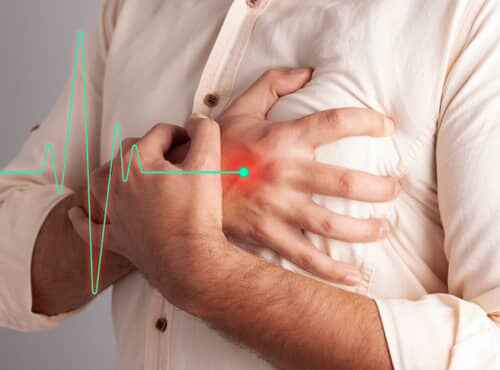Heart Failure Treatment in Ayurveda
Ayurvedic Remedies, Therapies, and Advice for All Your Health Issues, Recommended by Expert Health Professionals
What is Heart Failure?

The term heart failure can be terrifying. There is a basic myth on heart failure that people usually believe in - heart failure means the heart has stopped working. Let the truth be told- heart failure indicates that your heart is not pumping the blood as it is required to. When this occurs, blood often clots up, and fluid may accumulate in the lungs, troubling you even more.
Heart failure is a major health concern, impeding the health of millions of people worldwide. It is a prominent cause of hospitalization in people ageing more than 65.
Certain conditions linked to the heart, such as narrowed arteries or hypertension, are the indispensable risk factors that leave the heart too weak or stiff to pump the blood properly.
If you have heart failure, you still can lead a better life if you take care of yourself and bring some necessary changes in your routine. For instance, practising exercises regularly, staying physically active, losing weight, eating healthy food, eating fruits and vegetables, cutting down sodium, and managing stress.
Nonetheless, heart failure is life-threatening, and you need to keep a check on conditions that may trigger coronary artery disease or hypertension or diabetes or obesity.
Ayurveda also works best in the management of heart failure. It employs therapies and procedures to keep track of your heart health. Following a Satvik diet also does wonders for heart health.
What happens if you have heart failure?
When you first start to have a problem, the heart tries to compensate for this by:
Enlarging. The heart expands to continue with contraction and keep up with the blood supply. Over time, this makes the heart expand in size.
Having more muscle mass. As the heart size appears to expand, the contracting cells of the heart also increase in size, resulting in more muscle mass. This is how the heart pumps more strongly in the event of initial damage.
Pumping faster. By pumping faster, the heart aptly circulates more blood.
The body also tries to make up this by:
- Narrowing the blood vessels raises blood pressure even more and makes up for the heart’s loss of function.
- Also, down the line, the heart starts to deflect blood away from less important organs and tissues like the kidneys.
After some time, eventually, the body may not keep up with these measures and a person experiences breathing issues or fatigue that trick them to the doctor.
As the body continues to compensate for the function, you may not know about the declined function of the heart. So, a regular check-up with your doctor is a must.
Women and heart failure
Women are equally vulnerable to developing heart failure, but there are some conditions
- Women mostly get heart failure after they have begun menopause.
- Hypertension is the prominent cause of heart failure in women due to their vulnerability to stress.
- Women experience unexplainable shortness of breath more than men do.
Signs and Symptoms
Heart failure can be chronic (longstanding) or acute (abruptly onset). The signs, in any case, may include:
- Shortness of breath even when lying down
- Extreme fatigue and weakness
- Swelling in the ankles, legs, and feet
- Rapid or irregular heartbeat
- Persistent cough or wheezing with mucus
- Swelling of the belly or abdomen
- Unexplainable weight gain due to fluid buildup
- Nausea and vomiting
- Lack of appetite
- Difficulty concentrating or poor alertness
- Chest pain
Immediately make an appointment with your doctor if you are experiencing signs such as chest pain, fainting, breathlessness, and irregular heartbeats.
If you have heart failure, you may or may not have any of these signs. The signs mentioned above may not specify a weakening of the heart.
Causes
Coronary artery disease: CAD is a disease of the artery in which they become blocked or narrowed, and this results in a decreased blood flow to the heart muscle. With this, the heart does not get its nutrition (blood and oxygen) supply and becomes the cause of heart failure.
Heart attack. A heart attack is an impromptu blockage of the coronary artery, abruptly stopping the blood flow to the heart muscle.
Cardiomyopathy. Damage to the heart muscle caused by arteries other than due to impaired blood flow. For instance, due to infections or alcohol or drug abuse.
Conditions that pressurize the heart. Such as high blood pressure, valve disease, poorly controlled blood sugar, kidney disease, or congenital heart disease can also cause heart failure. In addition, heart failure can also happen when many conditions are present and oppress the heart function.
Other conditions may include:
- certain types of arrhythmias, or irregular heart rhythms
- high blood pressure
- emphysema, a lung disease
- severe forms of anaemia
- an overactive or underactive thyroid
- HIV
- cancer treatments, such as chemotherapy
- substance or alcohol misuse
Ayurvedic treatment for Heart Failure
For healthy living, Ayurveda places special emphasis on protecting the heart function. Not looking after your heart health can turn out to be distressing later in life. Hridya Avrodh is the name given to conditions that result in heart failure. The main channel that is associated with the heart is Rasa Dhatu, which is one of the seven tissues of the body. Conditions like improper eating, emotional and mental trauma, weakened digestive fire pose a threat to heart health. The result is Ama or toxins build up in the heart, which is the prime reason for aggravation of Rasa Dhatu. As more and more Ama accumulates in the channels, you are more likely to get congestive heart failure.
Ayurveda focuses on managing stress to promote heart health and keep up with the functions of the other organs. There are herbs in Ayurveda that promise strengthening of the heart muscles. Along with this, the stress is on following a healthy diet and lifestyle measures.
At AyuKarma, we have skilled ayurvedic practitioners to help you at every step. Rest assured, our ayurvedic practices for cardiac health are specific for every patient. We work on making the treatment effective for our patients by curating a customized diet chart for their health. All the procedures are strictly performed under the strict horizons of ayurvedic physicians and doctors.
Let us know if you want to book a consultation with us.
Approved by

Certificate no- AH-2022-0145
FEB 23,2022 - FEB 22,2025
